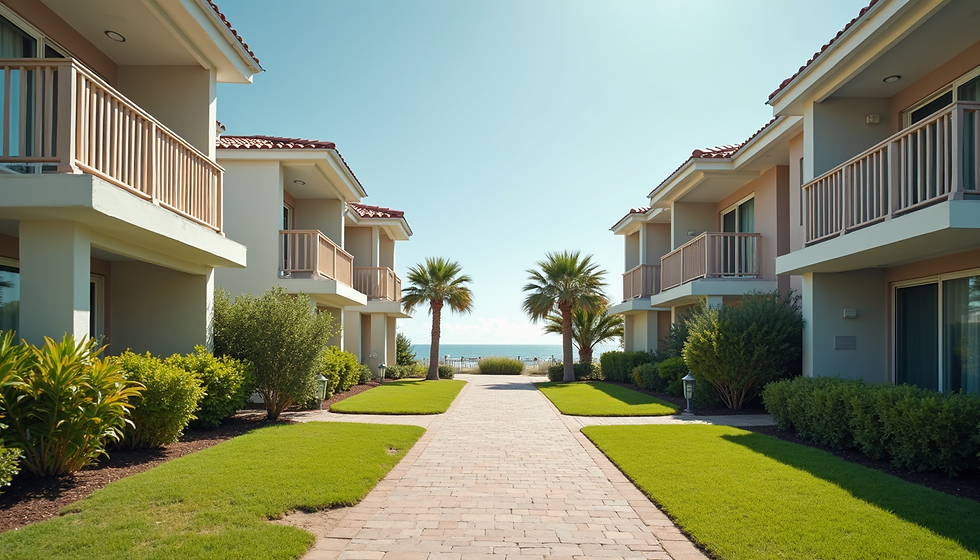Understanding Reserve Studies for South Florida Condominiums: A Vital Guide for Board Members and Managers
- Reserve Study Engineers
- Aug 3, 2023
- 3 min read
Updated: May 23
In the vibrant world of South Florida's real estate, condominium living offers a blend of culture, comfort, and convenience. However, maintaining these properties requires careful planning and foresight. This is where a reserve study becomes invaluable. A reserve study helps condominium boards and property managers effectively plan for the future, ensuring the longevity of their communities and preserving their investments.
This guide highlights the significance of reserve studies in South Florida, emphasizing their role in maintaining structural integrity and boosting overall property value.
What is a Reserve Study?
A reserve study is a detailed evaluation that determines the financial resources a condominium association needs to replace or repair major components over time. Key components analyzed include:
Roofs
Pavements
Elevators
HVAC Systems
Recreational Facilities like swimming pools and clubhouses
The reserve study assesses the current condition and estimates the remaining useful life of these components. It also calculates how much the association should set aside each year to cover future costs.
Types of Reserve Studies
There are generally two types of reserve studies:
Full Study: Conducted by professionals, a full study includes visual inspections and in-depth financial recommendations, providing a comprehensive view of the property’s needs.
Update: This revisits a previous study and updates estimates based on new data. It is less intensive and ideal for associations with established baselines.
Both types, customized for South Florida’s specific conditions, significantly enhance property management strategies.
The Importance of Reserve Studies for South Florida Condominiums
The unique South Florida climate greatly affects property wear. Here’s why reserve studies are essential:
1. Weather-Related Risks
South Florida’s frequent hurricanes and high humidity can wreak havoc on condominium structures. For instance, a well-conducted reserve study can assess roof conditions and prioritize funding for repairs or replacements. Data shows that properties with a proactive maintenance strategy can reduce repair costs by up to 30% as compared to those that react to damage after it occurs.
2. Enhancing Community Value
Resident satisfaction often hinges on the quality of their surroundings. Properties with well-maintained amenities and common areas typically have higher occupancy rates. A study by the National Association of Realtors indicated that properties with proper maintenance can retain value 15% higher than those that neglect upkeep.
3. Avoiding Unexpected Costs
Many condominium associations face the challenge of sudden special assessments due to insufficient funds. A proactive strategy, supported by regular reserve studies, can help boards maintain adequate funding, thereby preventing unforeseen expenses for homeowners.

Key Components Evaluated in a Reserve Study
A thorough reserve study covers several critical aspects of a condominium's infrastructure:
Roofing Systems: Prolonged sun exposure and storms can accelerate roof deterioration. New roofs in Florida can cost anywhere from $10,000 to $1,000,000+, making proper inspections crucial.
Pavements and Sidewalks: Regular reviews can identify minor issues early, preventing costly repairs later.
Mechanical Systems: Systems like elevators are expensive to replace, with costs reaching up to $250,000. Regular evaluations help manage these expenses.
Recreational Facilities: Amenities like pools and clubhouses enhance resident livability but require ongoing maintenance and updates.
Implementing a Reserve Study: A Simple Approach
Step 1: Assess Your Needs
Condominium boards should consider the specific characteristics of their buildings. Questions to ask include:
How old are the structures?
What has been the maintenance history?
Step 2: Hire a Qualified Professional
It is crucial to find a reserve study provider familiar with local conditions. A tailored report can greatly benefit the community.
Step 3: Review and Adapt
After the study is completed, boards should review the findings regularly and adjust reserve amounts based on community needs. Clear communication with residents about these adjustments reinforces transparency.
Final Thoughts on Reserve Studies
A reserve study is much more than a procedural task. It is an integral part of successfully managing a condominium community in South Florida. By focusing on strategic financial planning, boards can improve the living experience for residents while safeguarding property values and ensuring structural integrity for the future.
Investing in a reserve study today lays the groundwork for a worry-free tomorrow, balancing financial readiness with a quality lifestyle in one of the most desirable places to live.

Understanding reserve studies allows condominium boards and managers to make informed choices that will lead to a sustainable and prosperous community.


